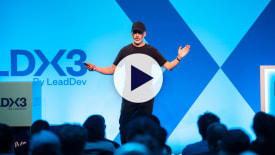
Latest videos
-

Try, try again
Learn why intelligent retries are essential for resilient systems, and how to implement them safely with proper limits and timing.
-

The magic of crisis
Discover how Staff+ engineers can use moments of crisis to drive lasting technical change and strengthen organizational systems.
-

Scaling LinkedIn’s search infrastructure: Key decisions and engineering challenges
Explore the key engineering decisions and challenges behind scaling LinkedIn’s search infrastructure to support billions of daily queries.
-

Technical Steering Groups: Balancing autonomy, technical alignment, and speed through strategic collaboration
Learn how technical steering groups drive technical alignment while fostering ownership – balancing autonomy and collaboration to fuel speed, innovation, and impactful decision-making across teams.
-

Honey, I shrunk the bill!
Learn proven strategies to reduce cloud spend by improving visibility, auditing usage, and optimizing data and microservices infrastructure for efficiency
-

10 things nobody tells you about OKRs
OKRs are a simple – and useful – sounding idea, but in practice, there are all kinds of troubles people get bogged down in. Here are ten, rarely mentioned, things that can help.
-

Becoming an AI Engineering company
Learn how to operationalize AI across your organization to drive innovation, improve efficiency, and stay ahead in a competitive market
Highlights from our conferences

Measure for Change
Picking metrics is one thing. But the harder decisions lie in what to do with them afterward.
View all videos from LeadDev London

Drive product gaps as an engineering leader
Discover practical strategies for engineering leaders to influence product development effectively, even in the absence of strong product management and a clear company vision.
view all videos from LeadDev NEW YORK

Growth in a downturn
In this talk, Smruti Patel asks, if hyper-growth is marked by spending more to make more, what does building for enduring growth look like?
view all videos from LeadDev berlin

Idea to Innovation
Join me as we embark on a journey to dissect the anatomy of innovation, uncover strategies to unlock the full potential of ideas, and transform them into impactful realities. Let’s build a strong culture of innovation, and make sure that it is not just a buzzword but a tangible outcome.
view all videos from staffplus london

Slack enterprise key management: Senior to staff lessons
Explore the key lessons and skills Audrei gained during their first Staff+ project, Slack Enterprise Key Management. This talk offers insights for anyone growing in their Staff+ career.
view all videos from staffplus NEW YORK
All videos
-

Understanding difficult conversations in your own organization
Real life situations and frameworks for having difficult conversations.
-

Turning conflict into empathy on engineering teams
How to create a safe space for open communication.
-

Communicating change: leading through the change curve
How to tailor your communications based on how your employees are experiencing and reacting to the change.
-

Creating the foundation for difficult conversations
How to build and cultivate trust as the foundation for difficult conversations.
-

Forging the path to faster shipping in enterprise orgs
Working for large corporates doesn’t mean you have to live with slower shipping times.
-

Carving a modern engineering org out of an enterprise
Adopting best practices from tech-first companies
-

The engineering leader’s guide to motivational anti-patterns
Motivation mistakes and how to avoid them.
-

Coaching, sponsorship, and feedback in your organization
Reflections on developing others from across management levels and spheres of influence.
-

Running efficient, effective, and engaging retrospectives
Supercharging your team from one sprint to the next.
-
Universal Apps: Architecture for the Modern Web
“In today’s web environment, performance and Search Engine Optimization (SEO) are important to successful apps. Universal architecture provides a hybrid approach to building web apps that combines server-side rendered applications and Single-Page Applications (SPA). This architectural approach improves the user experience and makes it easier for your site to serve content to search and social bots.
This talk will explain the methodology and benefits of the universal approach. It will explore some of the tradeoffs and challenges that come with universal architecture. Finally, we will cover the various implementation options available today. At the end of this talk, you’ll be able to evaluate if universal architecture is a good choice for your projects.”
-
Traps on the Path to Microservices
After Netflix helped popularize microservices, you probably heard the architectural pattern labelled a boon. However, if your team is tasked with implementing the pattern it is too easy to find yourself in a place where you’ve significantly increased your architectural complexity without deriving any of the benefits that microservices purport to bring, especially if implemented without proper organizational maturity or careful foresight and follow-through.
ThoughtWorks has led many teams and organizations along the path from monoliths to microservices and this presentation covers three of the major traps that we’ve experienced (as well as how to avoid them). The traps covered are, underestimating the cost of a microservice, overcentralization, and neglecting the monolith
-
Traps on the Path to Microservices
After Netflix helped popularize microservices, you probably heard the architectural pattern labelled a boon. However, if your team is tasked with implementing the pattern it is too easy to find yourself in a place where you’ve significantly increased your architectural complexity without deriving any of the benefits that microservices purport to bring, especially if implemented without proper organizational maturity or careful foresight and follow-through.
ThoughtWorks has led many teams and organizations along the path from monoliths to microservices and this presentation covers three of the major traps that we’ve experienced (as well as how to avoid them). The traps covered are, underestimating the cost of a microservice, overcentralization, and neglecting the monolith











